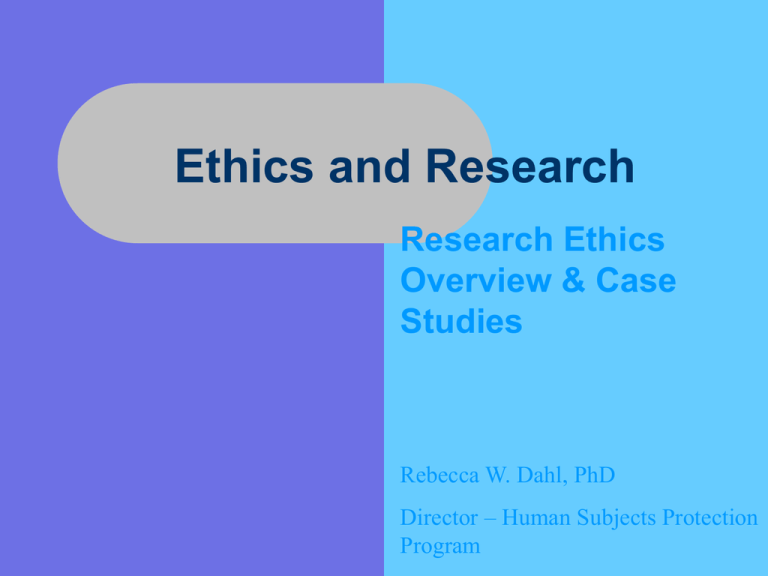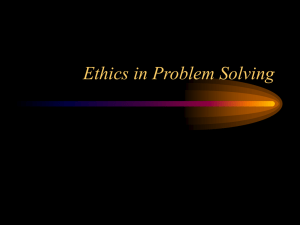Document
advertisement

Ethics and Research Research Ethics Overview & Case Studies Rebecca W. Dahl, PhD Director – Human Subjects Protection Program Research Ethics The following commentary by Nicholas von Hoffman appeared in the Washington Post “we are so preoccupied with defending our privacy against insurance investigators, dope sleuths, counter-espionage men, divorce detectives and credit checkers that we overlook the social scientists behind the hunting blinds who’re also peeping into what we thought were our most private and secret lives…” Joan E. Sieber Planning Ethically Responsible Research, p. 7-8 Research Ethics “Ethics is the disciplined study or morality….and morality asks the question…what should one’s behavior be”. Jeff Cooper Albany Medical Center, Ethical Decision Making, 2001, p. 1 Research Ethics “Greek ethos ‘character’ is the systematic study of value concepts— good, bad, right, wrong and the general principles that justify applying these concepts”. Joan E. Sieber Planning Ethically Responsible Research, p. 3 Research Ethics Basically, there are two types of ethics, Descriptive Ethics which asks what does the culture or society believe is morally correct? Jeff Cooper Albany Medical Center, Ethical Decision Making, 2001, p. 1 Research Ethics The other type or Prescriptive Ethics asks: How should I behave as a researcher? What character traits should I cultivate? Jeff Cooper Albany Medical Center, Ethical Decision Making, 2001, p. 1 Research Ethics Why is this so important? You will have many questions to answer and you will need a framework from which to answer those questions. Jeff Cooper Albany Medical Center, Ethical Decision Making, 2001, p. 1 Research Ethics Two types of ethical decisionmaking Deductive or principle based reasoning Inductive or case based reasoning Jeff Cooper Albany Medical Center, Ethical Decision Making, 2001, p. 1 Research Ethics Deductive or principle based reasoning – – – – Start with an ethical theory— Continue with a specific principle Develop rules Make judgments Jeff Cooper Albany Medical Center, Ethical Decision Making, 2001, p. 1 Research Ethics Deductive Reasoning Ethical Theory Principle Rules Judgment Jeff Cooper Albany Medical Center, Ethical Decision Making, 2001, p. 2 Research Ethics Deductive Reasoning Ethical Theory Principle Rules Peace Violence Judgment War Jeff Cooper Albany Medical Center, Ethical Decision Making, 2001, p. 2 Research Ethics Case Based Reasoning we have made – precedent Look back at those decisions and combine them in order to make a judgment Judgments reflect back on rules Rules reflect on our principles Principles reflect back to the ethical theory Decisions Jeff Cooper Albany Medical Center, Ethical Decision Making, 2001, p. 2 Research Ethics Case Based Reasoning we have made – avoid war and move to Canada (U.S. declares war on Canada) Judgment – defend yourself Rule – join Army (protect children Principles – family important Ethical theory Decisions Jeff Cooper Albany Medical Center, Ethical Decision making, 2001, p. 2 Research Ethics Deductive reasoning No WAR! Case Based Reasoning Fight WAR! Conflict Research Ethics Conflict Between Decisions When there is an argument Go back to the original principles – ask yourself “What were my original principles?” Original principles are in conflict or “incoherent” Jeff Cooper Albany Medical Center, Ethical Decision Making, 2001, p. 3 Research Ethics Conflict Between Decisions There will be conflict You will use both types of ethical decisionmaking to make decisions When conflict arises…go back to the original principles and try to create coherence by dealing with the specific principles Jeff Cooper Albany Medical Center, Ethical Decision Making 2001, p. 3 Research Ethics What does this have to do with research? Research Ethics Ethics is about creating a mutually respectful relationship with the research population Subjects are pleased to participate Community regards the conclusions as constructive Joan E. Sieber Planning Ethically Responsible Research, p. 3 Research Ethics An ethically insensitive researcher can leave the research setting in pandemonium the researcher the institution the cause that he/she seeks to promote Joan E. Sieber Planning Ethically Responsible Research, p. 3 Research Ethics Failure to treat subjects with respect can result in data that is: Misleading Inconclusive biased Joan E. Sieber Planning Ethically Responsible Research, p. 4 Research Ethics Scientists involved in the intense and demanding enterprise of research…often overlook the interests and perspectives of the research subject. Subjects may respond with lies and subterfuge. Joan E. Sieber Planning Ethically Responsible Research, p. 4 Research Ethics The problems encountered in behavioral research by the National Commission included: Lack of informed consent No debriefing (restoration to an emotional state equal to what was experienced before the experiment) Joan E. Sieber Planning Ethically Responsible Research, p. 7 Research Ethics The problems encountered in behavioral research by the National Commission included: Deception was a standard tool Invasion of privacy Joan E. Sieber Planning Ethically Responsible Research, p. 7 Research Ethics The problems encountered in biomedical research by the National Commission included: Lack of informed consent Disregard for risks encountered by the patient Deception Joan E. Sieber Planning Ethically Responsible Research, p. 7 Research Ethics The problems encountered in biomedical research by the National Commission included: Beecher - 1966 article was published in New England Journal of Medicine Tuskegee – untreated syphilis in black males Research Ethics Beecher - 1966 article was published in New England Journal of Medicine Penicillin and rheumatic fever Effect of high levels of blood CO2 Metastatic melanoma Jeff Cooper Albany Medical Center, History of Research Ethics, p. 4 Research Ethics Scientists attempted to critically examine questionable research practices and to recommend changes, but could not. Joan E. Sieber Planning Ethically Responsible Research, p. 4 Research Ethics So…the federal government brought numerous violations and issues to the forefront and in 1974 mandated the establishment of Institutional Review Boards (National Research Act) Joan E. Sieber Planning Ethically Responsible Research, p. 4 Research Ethics The role of the Institutional Review Board (IRB) is to determine whether the rights and welfare of the subjects are adequately protected and whether the study adheres to sound ethical and scientific principles Joan E. Sieber Planning Ethically Responsible Research, p. 4-5 Research Ethics Federal regulations have been established in order to provide the standards for monitoring all research activity related to people who volunteer as subjects for research. Abiding by these standards ensures the ethical conduct of research. Research Ethics The Act also created the National Commission for the Protection of Human Subjects of Biomedical and Behavioral Research (wrote the Belmont Report in 1979) Cynthia Dunn & Gary Chadwick Protecting Study Volunteers in Research, p. 16 Research Ethics The National Commission for the Protection of Human Subjects of Biomedical and Behavioral Research was commissioned to develop guidelines to assure that human research was conducted ethically. Cynthia Dunn & Gary Chadwick Protecting Study Volunteers in Research, p. 16 Research Ethics They were told to look at literature, look at arguments people made, review what ethicists were saying about research and ask…what are the fundamental principles behind the decisions people make or should make about research Jeff Cooper Albany Medical Center, Belmont Principles, p. 1 Research Ethics Belmont Report – 1979 Respect – treat others as autonomous agents, allow people choice Beneficence – acts of kindness that go beyond charity and duty…various obligations (i.e., do no harm, promote good) Justice – treat people fairly Jeff Cooper Albany Medical Center, Belmont Principles, p. 1 & 2 Research Ethics Applying the Principles of the Belmont Report Principle Meaning Practice Respect for Persons Each person has individual rights Obtain informed consent, protect privacy, maintain confidentiality Beneficence Provide benefit, protect from harm, limit risk Risk-benefit assessment made Standard procedures used Equitable selection of subjects Includes all groups that may benefit but does not single out one group Justice Practice of the IRB Two entities within DHHS have authority to oversee the conduct of clinical trials and IRBs OHRP Primary duty is to implement policies and regulations that involve humans (Before 2000 the office was OPRR) FDA Oversees the regulation of drugs, biologics, devices, foods and veterinary medicines Practice of the IRB FDA OHRP Relies on an assurance of compliance that is negotiated with the institution (the Assurance document sets forth the means by which the institution will comply with regulations) Uses a system of inspections and audits (Inspects the IRB on a routine basis) Practice of the IRB FDA OHRP HHS regulations related to IRB responsibilities are codified at 45 CFR 46 FDA regulations related to IRB responsibilities are codified at 21 CFR 50, 56 and are similar but not identical to HHS (audits occur approximately every 4 years) Research Ethics Six Norms of Scientific Research research design – takes into account relevant theory, methods, and prior findings Valid Joan E. Sieber Planning Ethically Responsible Research, p. 19 Research Ethics Six Norms of Scientific Research of researcher – capable to carry out the procedures Competence Joan E. Sieber Planning Ethically Responsible Research, p. 19 Research Ethics Six Norms of Scientific Research of consequences – assessment of risks and benefits (maximizing benefit and minimizing risk) Identification Joan E. Sieber Planning Ethically Responsible Research, p. 19 Research Ethics Six Norms of Scientific Research of subjects – appropriate to the purposes of the study, representative of the population that will benefit from the research and appropriate in number Selection Joan E. Sieber Planning Ethically Responsible Research, p. 19 Research Ethics Six Norms of Scientific Research informed consent – obtained before study begins, without undue threat or inducement, with enough information, and agreement to participate Voluntary Joan E. Sieber Planning Ethically Responsible Research, p. 19 Research Ethics Six Norms of Scientific Research for injury – responsibility for what happens to the subject (federal law requires that subjects be informed about compensation, but does not require compensation) Compensation Joan E. Sieber Planning Ethically Responsible Research, p. 19 Research Ethics “The public’s perception of research, its benefits and its risks is shaped by the way research is conducted”. Dunn & Chadwick, 1999 Case Study #1 A researcher plans to study the effects of competition on ability to solve math problems. Half of the subjects will be told that the researcher wants to see what approach they take in solving math problems. The other half will be told that the researcher wants to see which persons choose the best approach Joan E. Sieber Planning Ethically Responsible Research, p. 21 Case Study #2 A researcher plans to compare the intellectual skills of retired people to those of college volunteers to receive an A in their psychology course, and for nonvolunteers to have their grade lowered. To recruit retired people, she plans to go to a retirement community each evening, knock at people’s doors, and ask them to work some puzzles, not explaining details of the study because most wouldn’t understand. Joan E. Sieber Planning Ethically Responsible Research, p. 21 Case Study #3 A graduate student plans to compare drug use among college freshman and seniors. Because she may want to reinterview some subjects later, she plans to write their names and phone numbers on their data sheets. She plans to promise confidentiality, so that subjects will trust her, and to keep the data in her dorm room in a locked file. Joan E. Sieber Planning Ethically Responsible Research, p. 21









